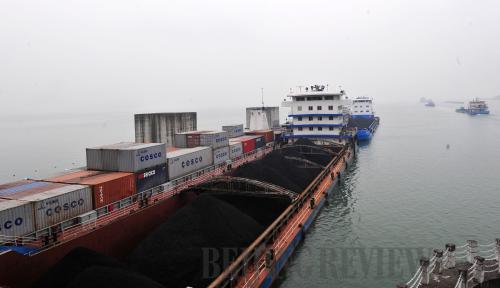|
 |
|
RIVER TRAFFIC BOOM: A freighter waits to enter a lock chamber. The Three Gorges Dam's double-way five-step ship lock recorded cargo traffic of 78.8 million tons in 2010, hitting a record high (ZHENG JIAYU) |
Numbers of the Week
$108.48 billion
China's non-ferrous metals imports and exports rose 46.5 percent year on year to $108.48 billion in the first 11 months of 2010, said the Ministry of Industry and Information Technology.
173.23 billion yuan
Sales revenues under China's program to subsidize farmers' purchases of home appliances totalled 173.23 billion yuan ($26.1 billion) last year, up 170 percent from a year ago, said the Ministry of Finance.
TO THE POINT: The World Bank makes history by selling yuan-denominated bonds in Hong Kong for the first time. China's manufacturing industry loses steam as the Purchasing Managers Index slowed in December 2010. Despite a gloomy year in 2010, hopes remain high for the stock markets to wake up from their slumber. Pressures mount on China's shipyards to make ends meet. Property developers cashed in on the real estate bonanza by selling a record number of houses last year.
By HU YUE
Milestone Bond Issue
The World Bank on January 4 issued its first bond denominated in the yuan, China's currency also known as the renminbi. The 500 million yuan ($76 million) of two-year fixed-rate notes, due on January 14, 2013, offers investors a semi-annual coupon of 0.95 percent.
This is the first renminbi bond issuance in the Hong Kong capital markets in 2011, and the World Bank's first renminbi bond ever.
The transaction comes at a time when China's shareholding in the World Bank is set to increase as part of the realignment of voting shares announced in April 2010. If the realignment is formally approved and subscribed as proposed, China would become the third largest shareholder in the World Bank after the United States and Japan.
The entry of the World Bank into the renminbi bond market in Hong Kong will further deepen the market and permit investors to diversify their currency holdings and expand their renminbi exposure.
Doris Herrera-Pol, Global Head of Capital Markets at the World Bank said, "This is a landmark transaction for the World Bank, and signals its strong interest in supporting the development of the renminbi market."
Anita Fung, Group General Manager and Head of Global Banking and Markets, Asia-Pacific, HSBC, said, "Hong Kong continues to take decisive steps in its development as an offshore renminbi center. Backed by our deep Greater China experience and international connectivity, HSBC is proud to lead the bond issuance and help drive the development of the offshore renminbi market in Hong Kong."
PMI Slows
The Purchasing Managers Index (PMI), a barometer of manufacturing activities, reached 53.9 percent in December, down 1.3 percentage points from November, said the China Federation of Logistics and Purchasing (CFLP). Before dropping in December, the index had been rising for four consecutive months, said the CFLP.
But this still marked the 22nd straight month in which the index was above the boom-and-bust line of 50 percent. The PMI includes a package of indices to measure manufacturing sector performance. A reading above 50 percent indicates economic expansion.
It seems that the manufacturing industry is expanding at a slower pace, said Zhang Liqun, a researcher at the Development Research Center of the State Council.
"The new orders sub-index dropped to 55.4 percent in December, compared with 58.3 percent in November, as stocking demands of enterprises tapered off," he said. "But the macroeconomy is less likely to wither, since exports and investments have been burning hot."
Meanwhile, it is believed the slight drop in PMI will help soothe worries that inflation is getting out of hand in the country.
"Growth is not overheated, and the chance of inflation spinning out of control is unlikely," said Ting Lu, an economist at the Bank of America-Merrill Lynch in Hong Kong. "Policy will be tightened, but don't expect excessive measures."
Bumpy Road
For many Chinese equity investors, 2010 meant more despair than cheer.
While the economy picked up steam, the Shanghai Composite Index tumbled more than 14 percent in 2010, one of the worst performances among major global markets. The CSI 300, an index of China's top 300 stocks, nosedived 14.3 percent while the Shenzhen Composite index, which tracks the country's second bourse in Shenzhen plunged 11.4 percent.
| 